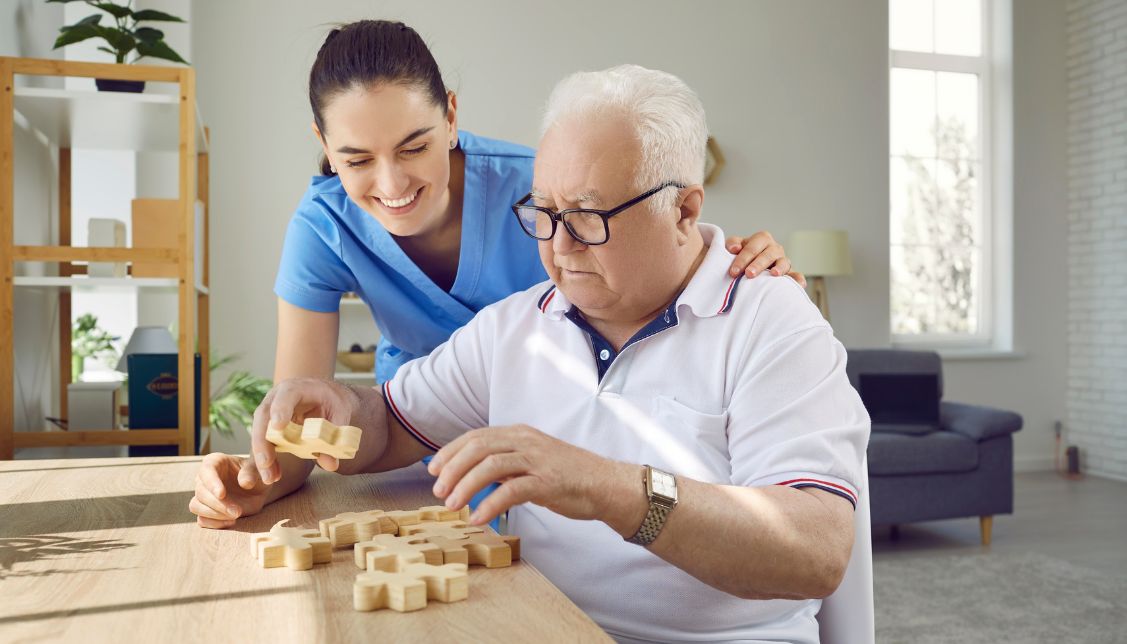 Add My Company
Add My Company
Navigating Challenges for Dementia Sufferers

Caring for dementia patients can be challenging, particularly when you’re looking after a family member or close friend. The changes in behaviour and mood swings will impact your wellbeing, as well as their own.
There are almost one million people in the UK with dementia and many are looked after by a loved one, rather than a professional healthcare worker. According to national charity Dementia Carers Count, around 90% of family carers receive no support and some say they often feel “invisible” and at “crisis point”.
While looking after the physical needs of a family member with dementia, it can be heartbreaking witnessing them slipping away mentally, especially when they experience a bad day. Despite the stress of being a carer; dementia support can be rewarding, especially if you seek help when you need it from health and social care professionals. Helping someone to improve their quality of life and chatting about memories when they have periods of clarity makes you realise the person you love is still there inside.
What is dementia?
Almost 10% of people aged 65 and above in the UK have dementia. Data suggests the number will increase to more than one million by 2030, as we’re living longer in general.
Carers play a crucial role in looking after dementia patients’ wellbeing, but it’s important to do so without letting your own health suffer through stress and exhaustion.
The term “dementia” describes a set of symptoms that become more severe over time, impacting memory and behaviour. The most common type is Alzheimer’s disease
Early signs of dementia can be mild. They can include memory problems, slower thought processes and issues with perception and language. Over time, these symptoms are more noticeable, and the person may need reminding of everyday things frequently.
They’re likely to start needing a carer during the mid-stages of the condition to help with activities such as eating, washing and dressing. As symptoms worsen, their memory will decline, causing them to repeat the same questions many times. They may not recognise friends and family.
It is very upsetting for loved ones if a parent or grandparent forgets who they are, but patients can have bad days and good days, forgetting someone but remembering them again later.
How is dementia diagnosed?
Obtaining a dementia diagnosis for someone you know is very important to access the right treatment. A GP will conduct an initial assessment by inquiring about the symptoms, as they may not necessarily indicate dementia and could be related to another condition.
They will carry out standard thinking and memory tests and a physical examination if required. They can also take urine and blood samples for diagnosis.
After dementia is diagnosed, talk to your GP or specialist about what treatments are available.
What causes dementia?
There can be different reasons why a person has dementia. Research suggests someone with a family history of Alzheimer’s may be more at risk, but this isn’t always the case. Someone with no family history of Alzheimer’s can have symptoms, so there’s no definite pattern.
Research suggests it is caused by an abnormal accumulation of two proteins, tau and amyloid respectively, causing “tangles” within brain cells and a build-up of plaques around brain cells. However, scientists don’t fully understand how these proteins lead to the loss of brain cells and research is ongoing.
Vascular dementia can begin after a stroke that cuts off the blood supply to part of the brain, or due to the gradual narrowing and blockage of the brain’s small blood vessels.
What are the main dementia treatments?
Currently, there is no cure for dementia, but treatments are available to help ease some of the symptoms. Mainly, these comprise medication, with four relatively new drugs approved for use in the UK: donepezil, galantamine, rivastigmine and memantine.
Modern technology, including Smart devices such as Google Home, Amazon Echo and Apple HomePod, are also helping dementia patients. The voice-activated device can be set to remind the person when to take medication or complete a task such as eating.
What are the main challenges for carers?
As well as the challenges of caring for a patient’s physical needs, it can be hard mentally to see a loved one having memory problems.
In the early stages, you may not notice a marked decline, but when the symptoms worsen, helping the person to maintain skills is important. They are likely to feel scared, anxious and stressed because they forget things and struggle to follow a conversation.
Talking to them and helping them to maintain an active life, especially socially, is just as important as assisting with physical tasks such as cooking, washing or looking after pets.
Beds for dementia
Ensuring dementia patients have a good night’s sleep is important, as the condition can lead to sleep disturbances. As dusk approaches, dementia sufferers can become increasingly confused, restless, agitated and distressed.
When the sun sets and it gets dark, they can experience a condition called “sundowning”, making it difficult for them to fall asleep. They may awaken frequently during the night and feel disoriented and confused.
Specialist beds for dementia patients can help by providing a safe and comfortable environment, especially if the person is fully mobile. The Stellan Complex Care System features strong padded sides up to 700mm high that help reduce the risk of a fall. The height of the bed frame to the floor can be lowered to 220mm for improved safety. Castors with brakes stop the bed from moving, while the system is compatible with dynamic air mattresses, foam mattresses and the Stabilo positioning sleep system.
The Dali Electric Nursing Bed is a four-section variable-height profiling bed made from the highest quality components and tested beyond the latest requirements of British and European standards. With side rails and a height adjustment range of 200mm to 620mm, or 400mm to 800mm, it has side rails for extra safety. The bed’s height, back and upper leg rest are adjustable electronically.
Coupled with a sleep routine, including minimum noise and dimmed lighting in the evening; a safe and comfortable bed will help the patient sleep more soundly, and if they have a more refreshing night, that will likely make for a better day for you, the carer.
For more information on Navigating Challenges for Dementia Sufferers talk to Kinderkey Healthcare Ltd

